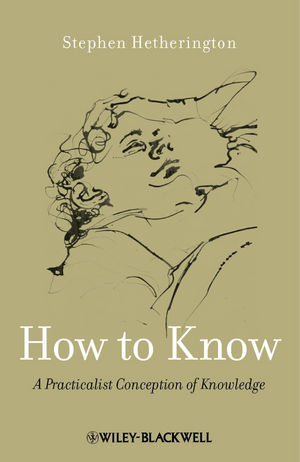
How to Know
Wiley-Blackwell (Verlag)
978-0-470-65812-3 (ISBN)
Some key aspects of contemporary epistemology deserve to be challenged, and How to Know does just that. This book argues that several long-standing presumptions at the heart of the standard analytic conception of knowledge are false, and defends an alternative, a practicalist conception of knowledge.
Presents a philosophically original conception of knowledge, at odds with some central tenets of analytic epistemology
Offers a dissolution of epistemology’s infamous Gettier problem — explaining why the supposed problem was never really a problem in the first place.
Defends an unorthodox conception of the relationship between knowledge-that and knowledge-how, understanding knowledge-that as a kind of knowledge-how.
Stephen Hetherington is Professor of Philosophy at the University of New South Wales in Sydney, Australia. He has previously published six books, mostly in epistemology. These include Good Knowledge, Bad Knowledge (2001), Reality? Knowledge? Philosophy! (2003), Self-Knowledge (2007), and Yes, But How Do You Know? (2009). He has also edited two books, including Epistemology Futures (2006).
Preface and Acknowledgements x 1 The Standard Analytic Conception of Knowledge 1
1.1 'Knowing is a Belief State (or Something Similar)' 1
1.2 'Knowledge is Well Supported' 4
1.3 'Knowledge is Absolute' 6
1.4 'Knowing Includes not being Gettiered' 9
1.5 'Knowledge-that is Fundamentally Theoretical, not Knowledge-how' 10
1.6 The Standard Analytic Conception of Knowledge 11
1.7 Prima Facie Core Problems 12
1.7.1 The justificationism problem 13
1.7.2 The Gettierism problem 17
1.7.3 The theoreticalism problem 20
2 Knowledge-that as Knowledge-how 26
2.1 The Rylean Distinction 26
2.2 The Rylean Argument 28
2.3 Wittgenstein on Rule-following 31
2.4 The Knowledge-as-Ability Hypothesis 34
2.5 Justification 47
2.6 Grades of Knowledge 49
2.7 Denying Knowledge-Absolutism: Clear Precedents 51
2.7.1 Augustus de Morgan 51
2.7.2 Rudolf Carnap 52
2.7.3 Norman Malcolm 53
2.7.4 W. V. O. Quine 53
2.7.5 Jaakko Hintikka 54
2.7.6 David Lewis 54
2.7.7 Alvin Goldman 55
2.7.8 Christopher Peacocke 56
2.7.9 Ernest Sosa 57
2.7.10 Baron Reed 58
2.8 Denying Knowledge-Absolutism: Possibly only Apparent Precedents 60
2.8.1 Locke 60
2.8.2 Russell 61
2.8.3 Contextualism 62
2.9 Sceptical Challenges 65
2.10 Sceptical Limitations 67
2.11 Epistemic Agents 70
2.12 Abilities 73
2.13 Rylean Mistakes 74
2.14 Conclusion 75
3 Gettier? No Problem 76
3.1 Gettier Situations 77
3.2 A Counter-Example to 'Gettier's Official Result' 80
3.3 Ordinary Gettiered Knowledge 82
3.4 A Meta-Gettier Problem 84
3.5 Objections Answered 84
3.6 Gettier-Luck as Veritic Luck? 88
3.7 Gettier-Luck is not Veritic Luck 90
3.8 Gettier-Luck is Combinatorial Luck 92
3.9 Combinatorial Luck: Applications 94
3.10 Knowing in a Combinatorially Lucky Way 98
3.11 Gettier-Holism Versus Gettier-Partialism 101
3.12 Combinatorial Safety 106
3.13 Combinatorial Gradational Safety 109
3.14 Epistemological Privilege and Epistemological Empathy 111
3.15 Gettier Situations and Sceptical Situations 116
3.16 Timothy Williamson 120
4 Is this a World where Knowledge has to Include Justification? 129
4.1 Justificationism, Broadly Understood 129
4.2 The 'Causally Stable World' (CSW) Thesis 131
4.3 Knowledge Within Causally Fluky Worlds 135
4.4 Knowledge as Putatively Pervasive 143
4.5 Non-tethering Justification 146
4.6 Linguistic Intuitions 148
4.7 Kinds of Intension 150
4.8 Conditional Justificationism 152
4.9 Knowledge Within Different Possible Worlds 155
4.10 Wholly General Justificationism 157
4.11 A Thin or Minimal Concept of Justificationism 160
4.12 Knowledge Within Causally Semi-fluky Worlds 163
4.13 Evidence and Counter-Evidence 165
4.14 Timothy Williamson 166
5 Knowledge-that as How-Knowledge 169
5.1 Knowing How it is that p 169
5.2 How-Knowledge that p and Gradualism 171
5.3 Degrees of Knowledge and Degrees of Belief 179
5.4 How-Knowledge that p and Truthmakers 182
5.5 Knowledge that p and Gradualism 184
5.6 Knowledge-Gradualism's Central Concept 186
5.7 Can there be Minimal Knowledge? 189
5.8 Minimal Knowledge as Foundational Knowledge 190
5.9 Knowledge-Gradualism: Closure and Scepticism 194
5.10 Knowledge-Gradualism: Content Externalism and Self-Knowledge 201
5.11 How not to Argue for Knowledge-Absolutism 204
5.12 Linguistic Evidence: Igor Douven 205
5.13 Linguistic Evidence: Jason Stanley 208
5.14 How-Knowledge-how that p 213
5.15 Knowing as Understanding? 214
6 A Practicalist Conception of Knowledge 219
6.1 This Book's Theory: A Summary and a Name 219
6.2 Core Problems Evaded 222
6.3 Further Practicalist Reconceptions 224
6.4 A Predictive Practicalism? 232
6.5 J. L. Austin on 'Trouser-words' 232
6.6 Wittgensteinian Certainty — Generalised 237
References 241
Index 254
| Verlagsort | Hoboken |
|---|---|
| Sprache | englisch |
| Maße | 160 x 236 mm |
| Gewicht | 553 g |
| Themenwelt | Geisteswissenschaften ► Philosophie ► Erkenntnistheorie / Wissenschaftstheorie |
| ISBN-10 | 0-470-65812-6 / 0470658126 |
| ISBN-13 | 978-0-470-65812-3 / 9780470658123 |
| Zustand | Neuware |
| Haben Sie eine Frage zum Produkt? |
aus dem Bereich


